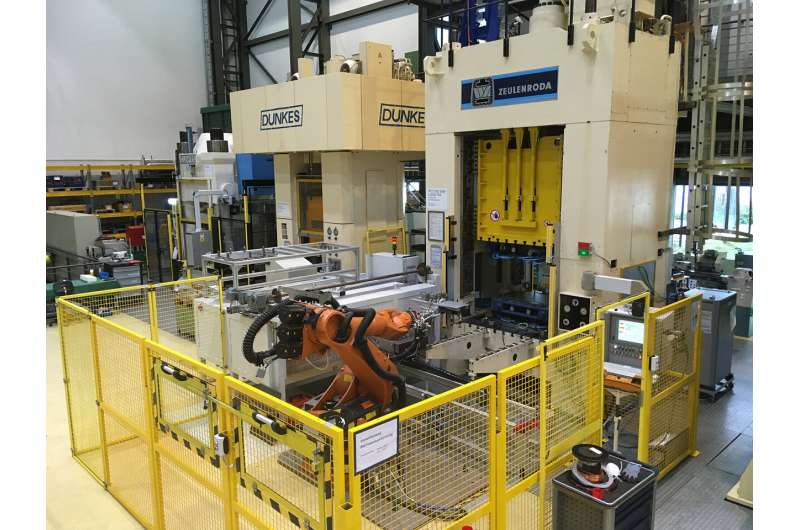How to quickly come to grips with complex manufacturing processes

Optimizing production plants so that they operate in a more energy-efficient way or produce fewer rejects is often difficult, as production quality depends on many different parameters. In the Fraunhofer ML4P lighthouse project, Fraunhofer experts have developed a process and software tools for comprehensively analyzing industrial production processes and adjusting them as required. Suitable for a wide variety of industries, ML4P will be presented at the Hannover Messe Digital Edition from April 12 to April 16, 2021.
Now more than ever, products made in Germany enjoy an excellent global reputation. However, just because products are of high quality does not necessarily mean that the production processes behind them are entirely perfect. On the contrary, many processes require optimization, even these days. Some need optimization to save energy or reduce rejects, while in others, production needs to respond more flexibly to demand. Plants also continue to struggle with consistently ensuring high product quality when the properties of the materials change from batch to batch.
Cracking the complexity of production plants
However, many established production processes are too complex to simply be adapted to new requirements. Essentially, there are too many variables to consider for the human mind to ever make sense of all the correlations between them. This is why six Fraunhofer Institutes joined forces three years ago to form the Machine Learning for Production (ML4P) lighthouse project, with the aim of using machine learning (ML) to crack the complexity of production plants and optimize production. First findings will be presented at Hannover Messe Digital Edition from April 12 to April 16, 2021. The partners have developed a range of software tools that can analyze production data in order to discover previously undetected correlations. However, the tools can do more than just analyze data and carry out optimization measures at a specific point in time—in environments with links to research, that was possible even before ML4P. What's special about these tools is that they go beyond that, allowing the process improvements achieved through machine learning to be incorporated into normal operational development cycles and life cycles in the long term.
The software isn't everything, says Lars Wessels, deputy ML4P project manager at the Fraunhofer Institute for Optronics, System Technologies and Image Exploitation IOSB in Karlsruhe—the place where the participating institutes' operations are brought together into a functional whole. "In this project, we developed a process model that allows us and our customer to progress toward our goal by stages. It's important to define a goal from the start and to check at an early stage whether it can be achieved with a justifiable level of effort and reasonable costs."

Combining plant and software expertise in the project
Among others, the project partners include Fraunhofer Institutes with expertise in production processes and plants. This enabled researchers to use real production environments—including a glass-bending plant—to test and optimize the software tools they had developed together. Recently constructed at the Fraunhofer Institute for Mechanics of Materials IWM in Freiburg, the glass plant offers facilities for folding large panes of glass to form a sharp 90-degree angle. This glass then goes on to be used for special architectural features such as corner windows, for example. The panes are pre-warmed in an oven, heated precisely at the fold using a laser, and then bent. Variables such as the oven temperature, the time spent in the oven, and the laser parameters must be configured very precisely. The Freiburg plant is operationally stable, but sometimes, the panes produced have a slightly rippled surface or some other visual defect—and they have to be scrapped. "The plant's experts would spot straight away that there was something wrong with a pane," says Christian Frey of Fraunhofer IOSB, the ML4P project manager. "However, it was often unclear what exactly had led to the defect." That's why for the analysis in this project, all the machine and production parameters were input into the software and then evaluated. "In manufacturing processes like this, the challenge is that you have hardly any standardized data the way you would with image or audio files, for example. Instead, there's heterogeneous process data that has to be preprocessed before automated analysis. That constitutes a large part of the work, and it means we have to bring in plant experts and their knowledge of the process," explains Lars Wessels.
Evaluating the extent of the digitization required
As it turned out, however, the existing data was not enough for the Freiburg plant project. Additional heat sensors had to be installed in the oven to measure the internal temperatures continuously. "Our process model is ideal for this kind of situation," says Lars Wessels. "Working closely with the customer, we can identify what process data we need in good time, and verify whether the expense will be worth it." At Freiburg, the answer was yes. The software tools can now assess which conditions result in defects, and so also predict the ideal conditions for processing glass with particular qualities—for example, glass panes of varying thickness.
In addition to the glass-bending process, the ML4P partners at the Fraunhofer Institute for Machine Tools and Forming Technology IWU location in Chemnitz have developed solutions for hot sheet metal forming. These can be used to determine ways of ensuring the quality of the metal when the plant's production speed is increased, for example. At the Fraunhofer Institute for Factory Operation and Automation IFF in Magdeburg, on the other hand, researchers are working to optimize filter manufacturing processes so that they produce fewer rejects.
"Depending on the degree of automation or digitization at a plant, optimizing it using our ML4P tools can be simpler or more complex," says Christian Frey. "However, with our multi-stage process model, both we and the customer can very quickly find out whether it's worth upgrading the plant." He points out that the process model would also be particularly helpful for communicating between plant experts and ML experts. "You can go over the plant and the data together in detail and define the scope of your target. When doing this, it's very important to us to incorporate the plant experts' knowledge into the ML4P software." There are plans to offer the tools developed in the ML4P project as a comprehensive package—including consulting support provided through the process model.
















